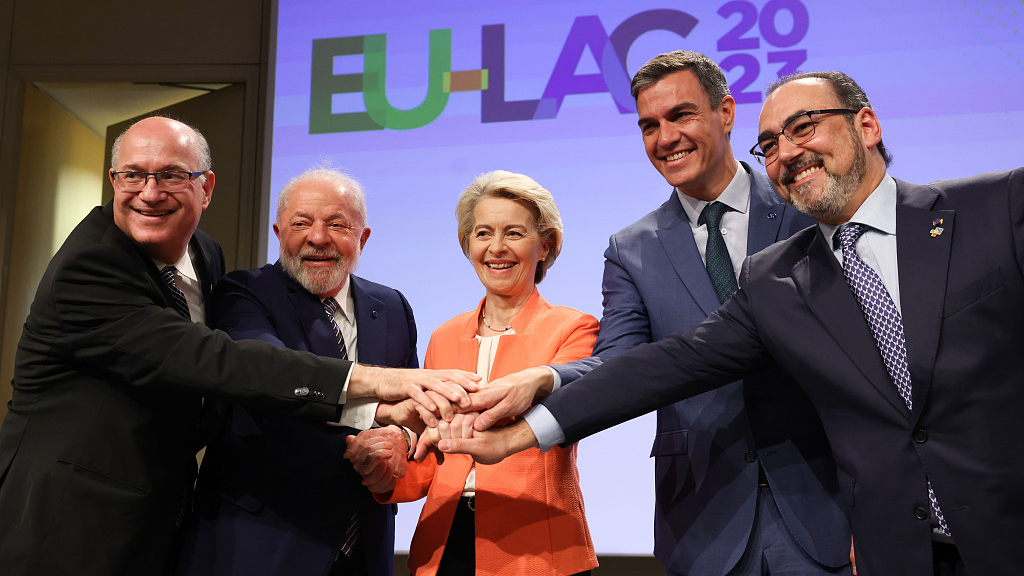Leaders from the European Union and the Community of Latin American and Caribbean States (CELAC) are gathered in Brussels (17-18 July) to strengthen partnerships between their blocs.
They are discussing working together to achieve fair green and digital transitions, and demonstrate a shared commitment to upholding the rules-based international order.
The summit is co-chaired by the President of the European Council, Charles Michel, and the Prime Minister of St. Vincent and the Grenadines, Ralph Gonsalves, in his role as CELAC pro tempore president.
The leaders are discussing how to harness the enormous potential of and opportunities offered by the twin green and digital transitions to increase the prosperity of their citizens.
The principles of a fair, social and just transformation will form the foundation of their engagement and ensure that no one is left behind.
During the summit, leaders have been addressing a wide range of topics with a view to further strengthening the EU-CELAC partnership, including:
- Enhanced cooperation in multilateral for
- Global peace and stability
- Trade and investment
- Economic recovery
- Efforts to combat climate change
- Research and innovation
- Justice and security for citizens
Implications of higher demand of raw materials
In their joint open letter addressed to the European and LAC Heads of States and Governments, the Justice and Peace Commissions of the two regions expressed their concern over the possible social and environmental implications of this enhanced partnership in Latin America and the Caribbean.
In the context of the current geopolitical situation in the world and with a view to meeting global climate targets, the EU has recently announced a set of actions to ensure access to “secure, diversified, affordable and sustainable supply of critical raw materials”, saying that it plans to promote “global partnerships to mitigate supply chain risks, reduce strategic dependencies and improve its resilience”.
However, note the Justice and Peace Commissions in their statement, increased European demand for raw materials will inevitably lead to more mining and extractive activities which will cause further damage to eco-systems and livelihoods of local communities if these activities go unchecked, and if private corporations are not made to respect environmental and social standards.
According to the Catholic Commissions, a recent EU proposal for a New Cooperation Agenda with Latin America and the Caribbean, to seek “mutually beneficial partnerships” with “high social, environmental and governance standards” does not provide “concrete details” on how these standards would be designed, safeguarded and eventually applied.
Corporations and due diligence
The Justice and Peace Commissions acknowledged the importance of “the much-needed and long-overdue” Corporate Sustainability Due Diligence Directive Corporate Sustainability Due Diligence Directive (CSDDD) currently being negotiated by the EU and requiring companies to establish due diligence procedures to address adverse impacts of their actions on human rights and the environment.
The Commissions also insisted that partnerships on raw materials and processes of a “just green transition” will only be “genuinely mutually beneficial”, if they “follow the premise of integral ecology and take into account all the related environmental, social, economic, human and cultural aspects.”
“Besides the recognition of past injustices that in certain forms regrettably still keep perpetuating imbalances and inequalities in EU-LAC relations, this very much also implies listening to the experiences of local communities affected by mining and extractive activities in partner countries”, the document says.
Recommendations
The Peace and Justice Commissions therefore offer a series recommendations and observations.
The first recommendation is to pay special attention to production areas that imply “high risks for local communities and their environment”, such as open pit mining; obtaining lithium carbonate by drilling salt flats in high-altitude wetlands; the extraction of fossil fuels; agricultural production through the intensive use of agrochemicals.
In this regard, the Commissions ask for clear deadlines and goals to be established for the transformation of these production and extraction systems, in order to gradually reduce the use of technologies and aggressive or polluting substances that affect people, the soil, water and the air.
Secondly, the open letter urges EU and CELAC decision-makers to convene and coordinate dialogues with economic, social and scientific actors to establish the parameters and reference bodies of these transformation processes.
The third request addressed to participants of the Summit is “to recognise the need for and to make a strong and concrete commitment to due diligence policies and to the Code of Conduct that companies will have to establish in line with the upcoming EU Corporate Sustainability Due Diligence Directive”.
It also pleads that the procedure for reporting breaches of due diligence obligations by companies in the area of Human Rights and environmental care established in the future EU Directive “be accessible to any person, group of people or public or private organisation anywhere in the world”.
Finally, given that the external debt of the countries of Latin America and the Caribbean often increases the pressure on them to accept agreements on the extraction and production of minerals, food and fossil fuels for export and for obtaining foreign currency to meet the payment obligations for this debt, the Justice and Peace Networks urge the Summit participants to issue a declaration on the urgency and need to significantly reduce the external debt of the LAC nations, “with the simultaneous commitment of CELAC members to apply the reduced amounts of debt to the process of transforming the systems of extraction and production of goods and food”.




















